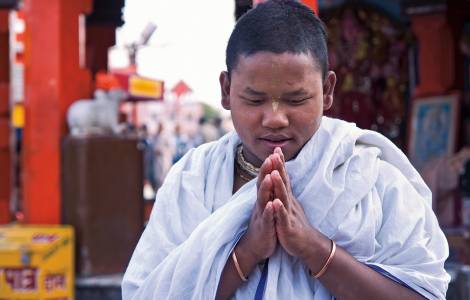
Nainital (Agenzia Fides) - Uttarakhand (Northern India) has become the seventh state of the Indian Federation to have approved an "anti-conversion law" that penalizes freedom of conscience and religious freedom.
As Fides learns, on 18 April Governor Krishna Kant Paul signed the bill "Freedom of Religion" ("Dharma Swatantrata Adhiniyam"), previously approved by a majority in the State Legislative Assembly.
Uttarakhand joins the states of Orissa, Madhya Pradesh, Chhattisgarh, Gujarat, Himachal Pradesh and Jharkhand, where similar laws are in force, which Hindu extremists ususally use to accuse Christians of "forced or fraudulent conversion".
The new law makes "forced conversions" a punishable offense, punishable by imprisonment between one to five years. If the victim of "forced conversion" is a minor, a woman or a person belonging to a lower caste or tribe (dalit), the minimum prison sentence is two years.
The law also makes it mandatory to obtain permission from the state government before religious conversion. An affidavit must be submitted to the district magistrate at least one month before the conversion. Persons who convert for marriage must submit the same sworn statement one month before the marriage. If this procedure is not followed, religious conversion will be invalidated and considered illegal by the state government and may invalidate the marriage.
Catholic John Dayal, spokesperson of the "United Christian Forum" and of the "All India Catholic Union", tells Fides that "the anti-conversion law was promoted by the Hindu nationalist Bharatiya Janata Party, without any real reason".
"There are no cases of forced or fraudulent conversion in the state." The only plausible explanation, therefore, is that of threatening minority communities or limiting the freedom of religion of the Dalits and of the weaker communities: their rights are crushed by the upper castes who exercise political power in the state". "We will bring the law to court and contest it in the public debate", said Dayal, a Catholic journalist and human rights activist.
Bishop Francis Kalist, at the head of the diocese of Meerut, in Uttarakhand, told Fides: "The law is discriminatory by nature, as implicitly addressed to Christians and other minorities". The Bishop fears that the law could "negatively affect the Church as it could be exploited to harass Christians".
The state of Uttarakhand has 10 million people, mostly Hindus. Christians represent less than 1% of the population, while Muslims make up 14% of the population, according to the 2011 census. The state is governed by the Hindu nationalist Bharatiya Janata Party (BJP). (SD) (Agenzia Fides, 4/5/2018)